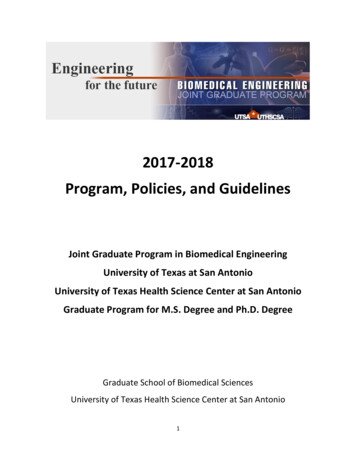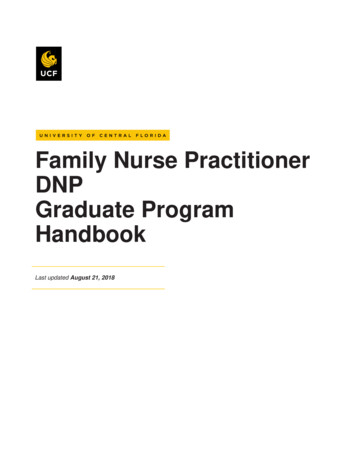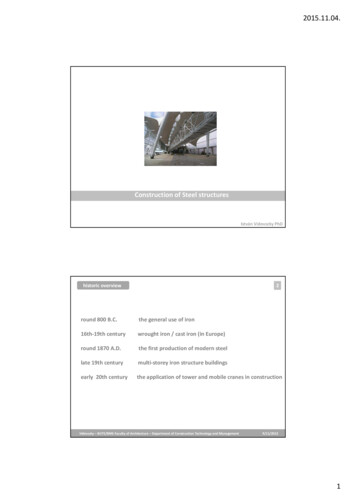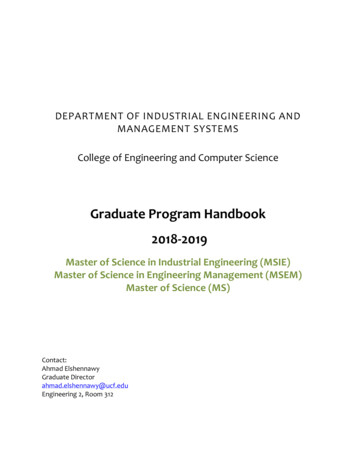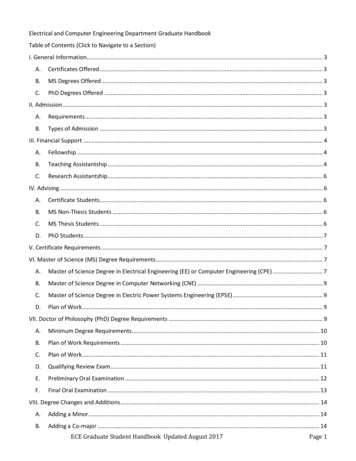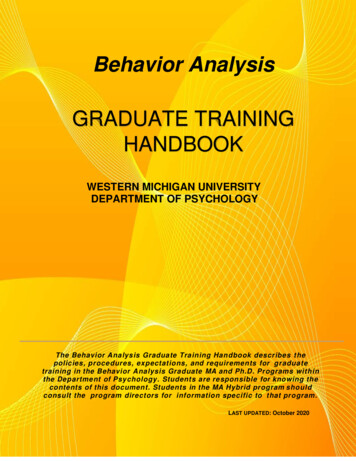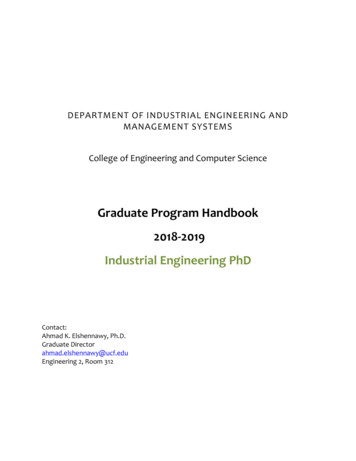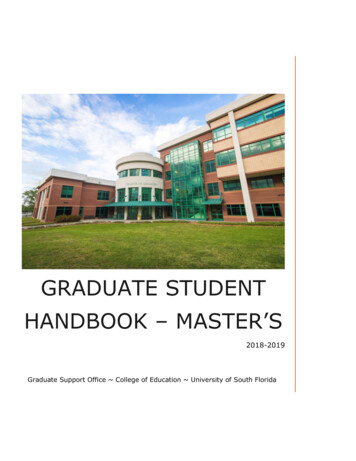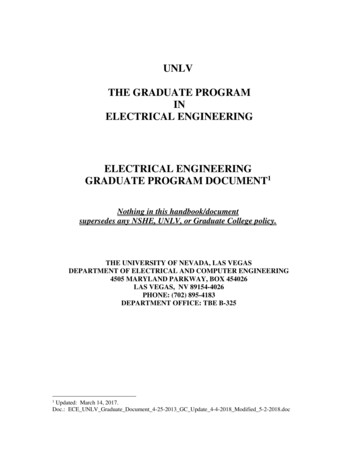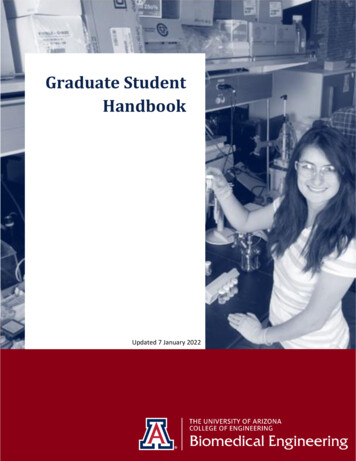
Transcription
Graduate StudentHandbookUpdated 7 January 20221 Page
Table of ContentsIntroductionProgram RequirementsGeneral444Admission Criteria5AMP Admissions Criteria5Graduate College Degree Requirements5Ph.D. Program6Transfer Credits6Qualifying Examination7Selection of Mentor8Plan of Study9The Comprehensive Examination10Comprehensive Exam Committee10Guidelines for the Comprehensive Examination.11Written Comprehensive Exam (research proposal)13Oral Comprehensive Exam14Advancement to Candidacy14Dissertation/Prospectus Form15Selection of the Dissertation Committee15Final Oral Examination (Dissertation Defense)15Inclusion of Published Papers in the Thesis/Dissertation16Penultimate Draft of Dissertation16Final Copies of Dissertation Document16Minor in Biomedical Engineering (Ph.D. Students Only)16Master of Science (MS) Program16Transfer from M.S. to Ph.D. program18Transfer Credits19Matriculation of M.D.-Ph.D. students in BME Ph.D. program19Accelerated Master’s Program (AMP)19PROGRAM TIMELINE:YEAR 12020YEAR 221YEAR 3212 Page
FINAL SEMESTERTEACHINGPROGRAM ADMINISTRATIONFINANCIAL STRUCTUREConferences2222222323Outside Activities24Intellectual Property24Deadlines24Appendix IBME 592- Laboratory Rotation2626Appendix IIBME 592 Laboratory Rotation Final Report2727Appendix IIICODE OF RESEARCH ETHICS2828Appendix IVBiomedical Engineering Ph.D. Course Requirement Worksheet2929Appendix VBiomedical Engineering MS Course Requirement Worksheet3030Appendix VIPhD Annual Report3131Appendix VIIMS Annual Report3232Appendix VIIISample Format for Mentor Acceptance Letter3333Appendix IXBiomedical Engineering Graduate Program3434Appendix XBiomedical Engineering Absence Request Form3535Appendix XIGuidelines for Mentors3636Appendix XIIChecklist for MS Students3939Appendix XIIIChecklist for PhD Students4040Appendix XIVResearch Proposal Details4242Appendix XVBME Dissertation Prospectus/Proposal Approval Form43433 Page
IntroductionWelcome to the Graduate Program in Biomedical Engineering (BME). The purpose of this handbook is tointroduce you to the various requirements that must be met before you are granted the Master of Science(M.S.) degree or the Doctor of Philosophy (Ph.D.) degree from the Graduate College of The University ofArizona.The Department of Biomedical Engineering is committed to providing a welcoming environment, a highlyrelevant curriculum, and learning experience as a part of your graduate studies in Biomedical Engineering.The strength of the BME Graduate Program derives largely from the flexibility afforded by theinterdisciplinary faculty who participate in the Program. This allows each student the freedom to design aunique program of study to meet individual career goals. However, the flexibility of this Programnecessitates careful coordination of your program of study with your faculty mentor, the BME GraduateStudies Committee, the BME Graduate Advisor, and the Graduate College. This handbook should be readupon entering the Program, and used, henceforth, in conjunction with the UA General Catalog(www.catalog.arizona.edu), as a reference regarding the policies and procedures of the BME GraduateProgram at The University of Arizona.The BME Graduate Program is intended to provide the foundation for a career in Biomedical Engineering. Toachieve this, the student requires (a) an appropriate base knowledge of life sciences at the molecular,cellular, organ, and systems level, (b) an appropriate base knowledge of an engineering specialty at thegraduate level, (c) experience and training in research, culminating in a major research project, (d)opportunities in teaching, and experience in disseminating research findings.The BME Graduate Program is designed for completion of the M.S. degree in approximately two years andthe Ph.D. degree in approximately five years. Obtaining the Ph.D. degree within this timeframe depends, inlarge part, on the motivation and self-discipline of the student. The Program is designed to introducestudents to research activities during their first year. By design, the coursework requirements are flexible sothat the needs of students with diverse areas of specialization can be accommodated. The student, inconjunction with a faculty mentor and the BME Graduate Studies Committee, designs an individualizedprogram of study.Program RequirementsGeneralAt The University of Arizona, the Graduate College sets the overall framework for the completion of the M.S.and Ph.D. degrees. Within these guidelines, the BME Graduate Program establishes specific requirementsand monitors student progress. The overall goals of these requirements are to ensure: breadth of knowledge in Biomedical Engineering depth of knowledge in the student’s area of specialty rigorous research training training in career skills (writing, speaking, critical evaluation of the literature)4 Page
opportunities for training in teaching skills exposure to employment opportunities in academic and industrial environmentsIn addition, the guidelines and requirements that are described in this handbook have been established toensure the protection of student interests and successful completion of the M.S. or Ph.D. degree.Admission CriteriaA Bachelor’s degree in engineering, physical or life sciences, or mathematics will be required for admission tothe program. Calculus I and II, ordinary differential equations, and at least one course in life science arenormally required for admissions. For applicable international students, English Proficiency credentials asstated on the Graduate College website: nternationalapplicants#english-proficiency Ph.D. application deadlines are December 1st for international students and January 6th for domestic studentsfor admission for Fall semester.M.S. application deadlines areo Fall: February 1st for international students and March 1st for domestic students.o Spring: August 1st for international students and September 1st for domestic students.AMP application deadline is June 1st for students who expect to graduate in May of the following year.AMP Admissions CriteriaStudents interested in the Accelerated Master’s Program (AMP) may apply after completion of a minimum of75 eligible undergraduate credit hours and can enter the program after completion of a minimum of 90eligible undergraduate credit hours. Applicants must have substantially completed their general educationrequirements and expect to complete their undergraduate degree in 4 years. The minimum GPA at the timeof admission and entry to the program is a 3.3, per Graduate College.Students applying to the BME AMP go through the regular graduate application process with the followingexceptions:1. In the personal statement, the student should indicate why they are interested in BME graduateeducation and the accelerated program specifically.2. The student does not need to take the GRE.3. Student is required to submit unofficial UA transcripts.4. Application code required. UAAMP721X01In addition to regular criteria, the admissions committee will evaluate whether the applicant hasdemonstrated the maturity necessary for success in an accelerated, highly competitive program.Graduate College Degree RequirementsStudents are expected to comply with the regulations of the Graduate College with respect to residence,credit hour requirements, and the Qualifying and Comprehensive Examinations (please refer to the GraduateCollege website http://grad.arizona.edu). A high level of performance is expected of students who areenrolled in graduate programs at The University of Arizona. Students must maintain a grade point average of5 Page
3.00 (letter grade of B) or better to continue enrollment in the degree-granting program, receive financialsupport, and to be awarded an M.S. or Ph.D. degree.The BME Graduate Program considers full-time enrollment for funded PhD students to be 12 graduate unitsper semester/MS students to be 9 units for their first two semesters of enrollment. After that, full-timerequired enrollment will be at least 6 graduate units per semester, unless the student is funded via GraduateAssistantship Research or Teaching, in which case the College of Engineering policy requires enrollment in 9graduate units.Graduate College regulations stipulate that at least 22 units (i.e. half the required coursework) on the Ph.D.Plan of Study must be in courses in which regular grades (A, B or C) have been earned.(http://grad.arizona.edu/).Ph.D. ProgramPh.D. students must complete a minimum of 63 units of graduate credit and meet the Graduate College’sminimum units of courses in which regular grades (A or B) have been earned. Requirements include: 15 unitsof the core BME courses (BME 510, 511, 516, 517, 561, 566, 577, 586; bolds are required for all students;choose 6 additional units from the others); 10 units in the major; a minimum of 9 units in the minor; 6 unitsof BME seminar/student forum; 3 units in a BME approved ethics course; 2 units of laboratory rotations(BME 592) and 18 units of BME 920 (dissertation). Courses will include graduate engineering, life or physicalsciences, or mathematics courses that focus on the student’s biomedical engineering research interestsaccording to the student’s plan of study. A Plan of Study should be developed by the student and facultymentor and a copy of the written plan, along with a one-paragraph summary of the proposed dissertationresearch area and a listing of the proposed Comprehensive Examination, shall be sent to the BME Programoffice for review and approval by the Graduate Studies Committee by October 1 of the third semester in theprogram.If the student and mentor decide to alter the Plan of Study, an amended plan shall be submitted to theGraduate Studies Committee for approval. Please see the BME Graduate Advisor for details on developingand submitting the Plan of Study.During the course of study, the student must pass the Qualifying Examination (to continue in the Ph.D.program), the Comprehensive Examination, and a Final Examination (dissertation defense).After completion of the required credits, a student in the Ph.D. program may wish to obtain the M.S. degree.Refer to Master of Science section of this handbook for the M.S. Program.Transfer CreditsIn some cases, certain degree requirements may be waived if equivalent course work has been completedpreviously. Please see Graduate College policies for transferring bility-graduate-transfer-credit). Once Graduate College policieshave been followed, the BME Graduate Studies Committee will review requests and make decisions about6 Page
course acceptance. Additional information such as the course syllabus, course description, or other itemsmay be requested. Please contact the BME Graduate Advisor for more information.Qualifying ExaminationExam timingOnce each year at the beginning of each Fall semester, with the first being in Fall 2019, during the weekbefore classes start. Full-time Ph.D. students are expected to take the exam in the week before their secondyear in the Ph.D. program begins.EligibilityStudents must have completed BME 510, BME 511, BME 517 (common cores), and two of the following: CoreElectives, with no lower than a “B” grade these courses and not be on academic probation. If students havealready taken 400-level version courses of these common cores and core electives at the University ofArizona, they are eligible for Qualifying Exam with the instructor’s consent. However, they should takeadditional 500-level courses to fulfill the unit requirement for graduation. If these core courses are changedin the future, students must complete the common cores and core electives from the updated lists.ContentA uniform, written examination, will cover three core subject areas: Biology for Biomedical Engineering (BME510), Physiology for Biomedical Engineering (BME 511), Measurement and Data Analysis in BiomedicalEngineering (BME 517) as well as two core-elective subject area, chosen from Biomedical Imaging (BME 516),Contrast Agents, Molecular Imaging, and Kinetics (BME 522), Biological and Synthetic Materials (BME 561),Biomechanical Engineering (BME 566), Intro to Biomedical Informatics (BME 577), or Biomaterial-TissueInteractions (BME 586).Students are allowed to ask the instructors of these core courses for guidance prior to the QualifyingExam. Questions are required to be submitted for GSC review by the end of the preceding April. Each exam question will be reviewed by GSC. ScheduleCore exam would be administered over two hours for three common cores (40 minutes per subject), thenstudents would receive one-hour lunch break, then return for one and a half hours for two core electivequestions (45 minutes per subject).Grading MethodologyEach subject area must be passed in order to pass the exam and proceed to the Ph.D. Comprehensive Exam.Each question on the exam is graded on a 100-point scale, and graded questions are turned in to theGraduate Studies Committee.7 Page
An average score for all students is then determined, separately for each question on the exam. If theaverage score for a question is below 75, all of the raw scores for that question are scaled up such that theaverage of the scaled scores is 75. If the average of the raw scores is above 75, the raw scores remainunscaled.For each of the 5 subject areas, if the subject score is above 65, the student passes the topic. If the subjectscore is below 65, the Graduate Studies Committee evaluates the performance of the student anddetermines whether or not the student passes or fails the topic. The committee may consider factors such asoverall group performance in a given subject area, and question difficulty. Thus, in some cases, students whoscore slightly below the passing threshold of 65 on a topic may be passed on that topic.If a student passes all subject areas, the exam is passed. If a single subject is failed and the four othersubjects are passed, the student’s performance is evaluated as “conditional”, and the student is given theoption of a re-test in the failed subject area. Scheduling of this re-test will be determined by the GraduateStudies Committee, within the same fall semester. If two or more subject areas are failed, the student failsthe exam and is permitted a single re-test of the exam when it is offered the following year. The student’sComprehensive Exam would also be delayed by a year.All students are permitted to receive copies of their graded answers after the results of the exam have beenannounced.Successful completion of the qualifying examination is required prior to taking the ComprehensiveExamination.Selection of MentorEach student should select a faculty mentor no later than the end of the second semester in the program. Afaculty mentor is a BME faculty member who will serve as an advisor, supporter, tutor, and role model. Afaculty mentor is expected to interact with the student on a regular basis providing guidance, advice, and theintellectual challenge necessary for the student to complete the degree program. Except in the case of selffunded M.S. students, the student is expected to work with the mentor and the BME Program to identify thesource of the student’s financial support after the initial year.The BME major advisor (mentor) cannot serve as the student’s advisor for a non-BME minor.The following suggestions may be of assistance to graduate students in choosing a mentor. There are twobroad areas that come into play when choosing a mentor. The first area has a professional basis and thesecond a personal basis. The choice of a mentor may be the single most important decision made duringgraduate training. When considering the professional aspects of your selection of a mentor, the followingquestions may prove helpful:1. What is this individual's reputation outside the University? Remember, when you have completedyour dissertation and you are looking for a position, your mentor's reputation will initially be yourreputation.8 Page
2. Does your prospective mentor have the funding available to support your research and stipend forat least four years? This area is probably the most problematic for graduate students. The moneyneeded to fund your research project will most likely come from your mentor's laboratory.Therefore, you will need to know, not only the amount of money available, but also the stability offunding.3. How does your prospective mentor's lab operate? You should critically evaluate the day-to-dayoperations of the lab and understand the goals of the lab and where you will "fit in". You shouldalso understand the role of your mentor in those operations. Some principal investigators have labmanagers or research assistants who run the laboratory. You should know almost as much aboutthese individuals as about your prospective mentor.4. What are the professional requirements of the prospective mentor on such issues as work habits,ethics, sharing of ideas, lab meetings, journal clubs, and authorship on papers?On the personal side, the answers to the following questions may be extremely helpful:1. Is the personality of my prospective mentor compatible with my own?2. Is this individual going to be responsive to my needs and, just as important, am I going to beresponsive to his or her needs? When you join a lab, your mentor will have certain expectations ofyou, and these should be identified when evaluating a prospective mentor. By the same token, whatare your expectations of a mentor?3. What do other students and faculty think about your prospective mentor? The collegial relationshipof your prospective mentor with others will influence your interaction with other laboratories.Be sure to place a great deal of importance and thought into your faculty mentor selection. Talk to otherpeople (including the mentor’s current and previous students) about your prospective mentor and askclarifying questions. Provide yourself with honest answers to both the professional and personal aspects ofyour decision. Laboratory rotations are an excellent way to learn more about prospective mentors and labsand can provide opportunities to answer these questions before choosing a mentor.Once you have identified a faculty mentor, you and your mentor should inform the BME Graduate Programof this selection in writing. The letter should indicate that the professor has agreed to serve as your advisorfor your graduate studies; they will endeavor to ensure that you have financial support (for Ph.D. students)during your tenure as a graduate student and that you complete the requirements for the M.S. or Ph.D.degree in a timely fashion. It should be signed by both the student and faculty member and submitted to theBME Graduate Advisor (See Appendix for sample letter).Plan of StudyA Plan of Study should be developed after passing the BME core courses. This should be done in conjunctionwith the Mentor, at the beginning of the second year in the Program. This Plan of Study identifies courses tobe transferred (if any) from other institutions, courses completed at the University of Arizona to be appliedtoward the Ph.D., and any additional courses that may be needed to fulfill the requirements for the Ph.D.degree. In addition, students must submit a one-paragraph summary of the proposed dissertation research9 Page
area and a listing of the proposed Comprehensive Examination Committee members. The student submitsthe Plan of Study to the BME Graduate Advisor, and needs approval by the student’s advisor/mentor, theBME Graduate Studies Committee, and the Associate Department Head for Graduate Affairs in theDepartment of Biomedical Engineering. Once approved, the student will then submit their Plan of Study inGradPath.The Comprehensive ExaminationBefore admission to candidacy for the Ph.D. degree, the student must pass a written and an oralComprehensive Examination.A student must meet the following requirements to qualify for the Comprehensive Examination: The student has successfully passed the Qualifying Examination The student has satisfactorily completed the core coursework (with a B or better) for their major andminor. Minor coursework may be concurrently registered in the semester the student plans to taketheir Comprehensive Exam. The student has submitted their Plan of Study via GradPath. The student has selected a Major Advisor and finalized a Comprehensive Examination Committee,also submitted via GradPath.The Comprehensive Examination is considered a single examination, although it consists of written and oralportions, both designed to meet two main objectives: To evaluate the proficiency of the student’s knowledge of biomedical engineering To evaluate the ability of the student to: independently evaluate and critique a body of biomedical engineering literature, integrate the acquired information into broad conceptual schemes, develop specific, measurable, and achievable goals design experimental approaches to evaluate hypotheses or achieve stated goals demonstrate the written and oral communication skills required to present, defend, anddisseminate research ideas and plans.The Comprehensive Examination must be taken no later than the fifth semester in the Program. The GSCmay grant an extension only for compelling reasons upon written petition by the student andrecommendations from the student's Major Advisor (if selected).Comprehensive Examination CommitteeBefore the beginning of the second year in the program, the student selects a Comprehensive ExamCommittee, which will conduct the exam. (This does not necessarily have to be identical to the student’seventual Dissertation Committee, but it can be.)The Comprehensive Examination Committee must consist of at least four members, including at least threemembers of the BME Faculty (one of whom is the Major Advisor) and one faculty member from the student'sminor field (if required). The Major Advisor and two additional members must be current tenured, or tenuretrack faculty members, or approved tenure equivalent. The fourth member may be tenured or tenure-track,or an approved special member. Special members must be pre-approved by the Dean of the GraduateCollege. Any members beyond the fourth can also be current tenured or tenure-track faculty members or10 Page
approved special members. Note: All members of the Exam Committee require Graduate Academic Advisor,Associate Department Head for Biomedical Engineering Graduate Affairs, and Graduate College approval.Additional representation on the Comprehensive Exam Committee may be requested.One of the BME faculty members, other than the Major Advisor, will serve as chairperson and will presideover all examinations and deliberations of the committee.SchedulingFor scheduling requirements of the Graduate College, students are advised to consult the GraduateAcademic Advisor and the Graduate College publication "Comprehensive Examination for Advancement toCandidacy."To formally schedule a doctoral oral comprehensive examination, students must use GradPath using the linkwithin the UAccess Student Center to submit the necessary forms. This process can take several businessdays and needs to be done well in advance of the examination.Students must have submitted earlier the “Responsible Conduct of Research” confirmation form and have anapproved “Plan of Study.”To schedule the oral comprehensive examination, students must submit the “Comprehensive ExaminationCommittee Appointment Form” prior to submitting the “Announcement of Doctoral ComprehensiveExamination”.Overview of the Comprehensive ExaminationThe Comprehensive Examination consists of two parts, a written and an oral examination. For the written exam, students prepare a research grant proposal that follows the guidelines of a NIHKirschstein Predoctoral fellowship (see “written examination” for guidelines). Other similar format(e.g., NIH R03/R21, NSF research proposal, DoD research proposal, etc.) may be used, if approved bythe student’s Comprehensive Examination Committee and the Associate Department Head forBiomedical Engineering Graduate Affairs. The oral examination consists of an in-depth examination of the topic addressed in the researchproposal and a broad examination that can cover any aspect of the BME graduate curriculum and/orthe chosen minor field of study (see “oral examination” for guidelines).The Comprehensive Examination will evaluate the written proposal, its oral defense, and fundamentalknowledge of biomedical engineering. Proficiency in each of these areas is necessary.Initial Preparation of the Comprehensive ExaminationThe student must convene an initial meeting with the committee to select: a specific topic for the research proposal a date for submission of the research proposal (written examination): 6-8 weeks after the topic isapproved by the committee a potential date for the oral examination: no later than 12 weeks after the initial meeting Notes from all committee meetings are required to be sent electronically to the Graduate Advisor forthe student’s file.11 Page
Prior to the first meeting, the student submits a pre-proposal to the committee (one page). The pre-proposalshould outline a rationale for the topic/problem to be studied and 2-3 questions (or Aims) that will beaddressed later in the proposal.The questions addressed by the pre-proposal must allow the student to develop and address a workinghypothesis regarding an unresolved issue, or an unmet need, in biomedical engineering. The pre-proposalshould reflect an informed analysis of the problem and the relevant literature and should be supported bykey citations.At the first committee meeting, the committee will evaluate whether the topic and the outlined questions ofthe proposal are appropriate to design a hypothesis-driven or engineering design research proposal. Thecommittee chair is charged with ensuring that an appropriate evaluation has been carried out and thatappropriate dates for the written and oral examination (see timeline) have been selected.It is recognized that sometimes it may be unavoidable that parts of a specific aim of a student’s proposal aresimilar to that of an active or submitted grant application by the advisor. The committee is tasked to definewhat degree such a “thematic” overlap is tolerable. If in question, the advisor may provide copies of therespective grant application to the committee.The written proposal must be primarily the work of the student. It is not permitted to cut and paste or“slightly” modify any part of an existing research proposal (being current or in draft form). If a partialthematic overlap exists, it is expected to exhibit significant divergence from existing ones.Completed research work should not be used as a research proposal, even if the work was completedprimarily by the student. This includes a journal article (published, submitted, or in preparation), aconference proceeding article (published, submitted, or in preparation), a conference presentation(presented), or any other equivalent work. Such completed research work can only be used as a backgroundmaterial for the research proposal.The research proposal can be used towards the student’s future dissertation.Before and during the preparation of the proposal, the student may have general discussions on backgroundinformation, or the strengths and weaknesses of experimental approaches and techniques with members ofthe Comprehensive Examination Committee or the Major Advisor. It is not appropriate to ask any otherperson to review any parts of the written proposal, even in draft form.Timeline Initial committee meeting and identification of a specific topic for the research proposal: ideallyduring the third or fourth semester; at the latest by the end of the fifth semester Deadline for submission of research proposal (time of written exam): 8 weeks after initial committeemeeting Written exam outcome, including written comments/feedback: no later than 2 weeks aftersubmission of the proposal Oral examination: 2-6 weeks after successful completion of written proposal12 Page
Written Comprehensive Examination (Research Proposal)After selection of the specific research topic, the student will have 6-8 weeks to write a grant applicationbased on the selected problem. The student will need to evaluate the literature in the selected area,formulate a significant and relevant hypotheses or engineering goals, and devise experimental strategies totest hypotheses or achieve goals.The topic of the research proposal can be from any area of biomedical engineering, and may be part, or thefocus of the student’s planned dissertation research. The emphasis of the research proposal should not bejust a review of the literature but a creative experimental dissection of the selected problem. The proposalshould address an unresolved issue in biomedical engineering. The proposal can be “hypothesis-driven”,where a hypothesis or hypotheses are generated, and experiments are designed to test them; or“engineering design” where technologies and methods are designed to solve a real-world problem.There is an expectation of substantial depth of knowledge in the research area. A key element of theproposal defense will be to explain and defend the importance of the questions to be addressed, and toplace these questions in the broader context of the field. Thus, in both the significance section of the writtenproposal and in the subsequent oral defense, the student should be able to marshal knowledge from therelevant literature and from broader areas of biomedical engineering.The research proposal should follow the basic form of an NIH Predoctoral NRSA grant application. Theproposal should aim to cover 3 years of research. Please see Appendix for additional guidance. As explainedin Overview section, other similar format (e.g., NIH R03/R21, NSF research proposal, DoD res
CODE OF RESEARCH ETHICS 28 Appendix IV 29 Biomedical Engineering Ph.D. Course Requirement Worksheet 29 Appendix V 30 Biomedical Engineering MS Course Requirement Worksheet 30 Appendix VI 31 PhD Annual Report 31 Appendix VII 32 MS Annual Report 32 Appendix VIII 33 Sam
